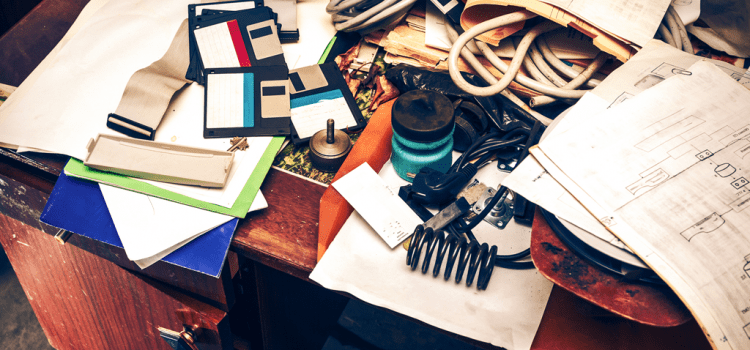A month ago, my desk was clear and my office was tidy. This is because I hadn’t been using it for a while – and prior to moving back in, I decided to take everything out, clean, and then replace just what I needed.
At the end of the process, I’d shredded, recycled or binned a lot of clutter and there was a sizeable pile of stuff that didn’t belong in my office. Everything was neat and tidy. Great!
The Reality Check
Everything was fine – except most of those things that didn’t belong in my office didn’t have another home to go to. And I haven’t had time to find them one since.
Some of them got bored waiting. They’ve wandered back in, returning like homing pigeons.
And they’ve brought friends.
So I’ve accepted it’s time to do a proper declutter. Yes, I know Einstein wittily implied that an empty desk is a sign of an empty mind, but I’m not after emptiness; just some order and, well, less STUFF.
The Three Deadly Ds of Clutter
Yes, less STUFF. Because clutter is Distracting, Demoralising and Depressing. Deep down, you know this is true – and there’s science to back up what we know instinctively.
Back in 2011, researchers at the Princeton University Neuroscience Institute published the results of a study they conducted in The Journal of Neuroscience. It was called “Interactions of Top-Down and Bottom-Up Mechanisms in Human Visual Cortex” and if you’re not a neuroscientist, it can be heavy going.
However, the two findings from the report that relate to clutter and our reaction to it aren’t too hard to understand:
- ‘Multiple stimuli present in the visual field at the same time compete for neural representation.’
Translation: If you can see a lot of stuff around you, it all competes for your brain’s attention. - ‘The capacity of the visual system to process information about multiple objects at any given moment in time is limited.’
Translation: It’s hard to think when you’re surrounded by a lot of things. If your attention is being drawn to the clutter, you won’t have much brain function left to think about your screen/notebook in front of you.’
So, it’s true; clutter is distracting and makes us less efficient. Is it really demoralising and depressing, though? Or is that just me?
Stress: The Final Frontier
No, it’s not. My instinctive and anecdotal belief that clutter can get you down is backed up by the findings of the UCLA’s Center on Everyday Lives of Families.
This 10-year project to document the lives and homes of middle-class American families that resulted in a book, Life at Home In The Twenty-First Century: 32 Families Open Their Doors. Many families had mountains of possessions and clutter, with some describing their homes as a “mess” and “very chaotic.” The CELF team’s psychologist colleagues, Darby Saxbe and Professor Rena Repetti, looked at the study participants’ levels of diurnal cortisol, a measure of stress, and found a link between the way these families felt about their homes and their diurnal cortisol levels – i.e., their stress.
“It’s difficult to find time to sort, organize and manage these possessions,” says Anthony Graesch, who co-authored the book and is now an assistant anthropology professor at Connecticut College. “Thus, our excess becomes a visible sign of unaccomplished work that constantly challenges our deeply engrained notions of tidy homes and elicits substantial stress.”
So it’s a vicious circle; while we’re not clearing the clutter, it’s sitting there making us feel guilty and inadequate, reminding us that it’s one more dreaded job on our to-do list. It both makes us less productive and reminds us that we’ve been less than productive in the past. It’s a double whammy.
“Clutter is delayed decisions,” productivity guru Barbara Hemphill famously said. And those delayed decisions are there on our desks and shelves, staring right back at us.
But no more. Over the Easter break, I’ll be getting tough with the clutter and making decisions left, right and centre. Hopefully, that will make working in my office a lot less dismal, depressing and distracting!







